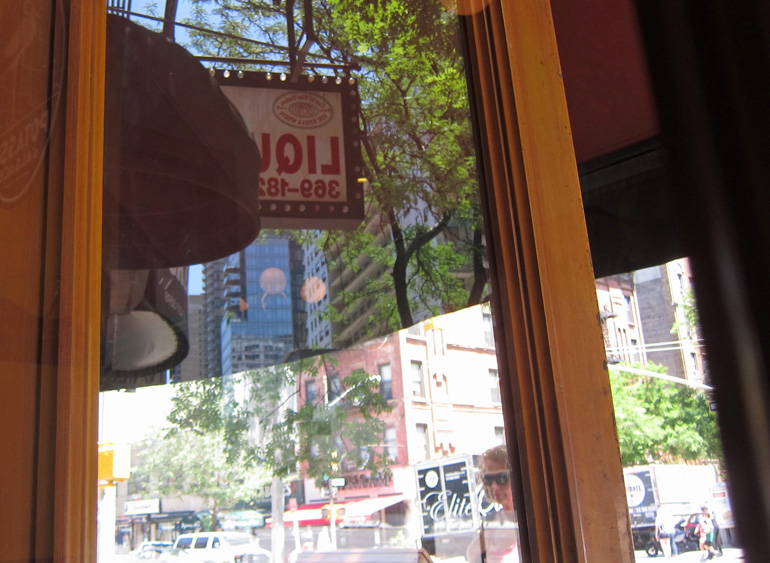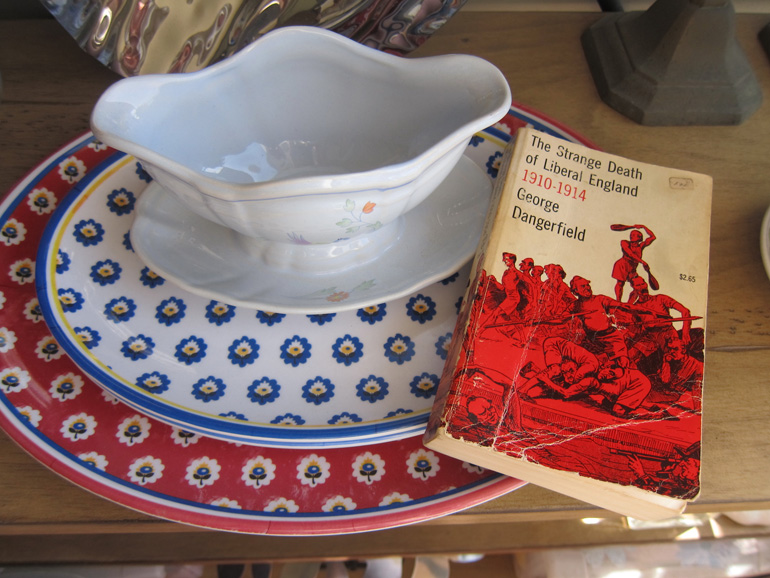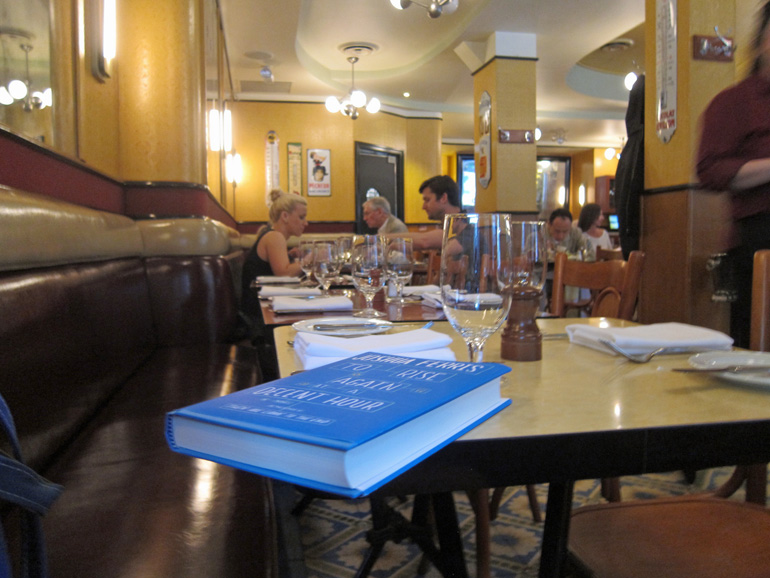Gotham Diary:
Weary Confidence
30 June 2014
Monday, June 30th, 2014
Outwardly placid, summer so far as not been an easy time. The usual quota of life’s uncertainties is weighted down by the ongoing subway project, which appears to be in mild recession so far as equipment goes but which still makes something of a military checkpoint of the intersection of East 86th Street and Second venue. Making things darker still is the news that ownership of our building has changed hands. What if the new owner intends to demolish the building? I have no reason to believe that any such plan impends — except that it would make sense to me, while also being (not really) “the worst thing that could happen.”
Given this background, I’ve been something of an anxious reader. The Riddle of the Sands has me perched on the edge of my chair. I’m reading this classic spy thriller of 1903 because I was so piqued to learn that its author, Erskine Childers, was later involved in running guns to the Irish Republicans. It turns out that there is a lot to learn about Childers, but, right now, I’m up to my neck in dashing Edwardian gallantry — and learning the names of all those East Frisian islands. The undertow of longing for a brave and exciting war that was not the war that actually happened is rather sea-sickening.
***
And then there is Chapter II of Book Second of The Ambassadors, a mass of dense paragraphs in which the author takes highly idiosyncratic stock of his hero, having pointedly awaited his arrival in Paris (from Liverpool, Chester and London) to do so. The novel’s preceding paragraphs have followed what I call James’s “dramatic” template: a few scene-setting paragraphs followed by protracted conversations that quite often bring the stage to mind. These chapters have also featured Maria Gostrey, a character whom I have always found too interesting and appealing to regard as playing a supporting role, although that, of course, is what she does. There is also the phlegmatic lawyer, Waymarsh, whom I can never like: it’s because of men like him that men like me have a hard time in America. Waymarsh’s constitutional distrust of Europe is a crashing bore, and by chapter 2.2 (as it were), even Strether is tired of him.
Now, we have Strether alone, with no one to talk to. The narrator follows Strether from Cook’s or American Express, near the Opéra, to the Luxembourg Gardens, where newly-received letters from home are read and digested. At length, Strether retraces some of his steps, returning to the Right Bank to have a look at the building in which Chad Newsome, the young man whom it is Strether’s job to “rescue” and send back to his family (and family’s business) in Massachusetts, has a flat. There, he finds a young man lounging on Chad’s balcony. It is almost certainly not Chad himself, but Strether ends the chapter by crossing the Boulevard Malesherbes to pay a visit.
The walk to the Luxembourg and the time spent sitting there are filled in with an account of things that only Henry James would make. He hovers near his hero, and overhears many of the impressions that cross Strether’s mind as he passes through Paris for the second time in his life. The first visit, thirty years earlier, was a honeymoon trip with his even younger wife, from which he sailed back home with twelve “lemon colored” novels and dreams of a literary career. Those dreams have long since come to naught; the young wife died young, and their son died, too, as a schoolboy; Strether’s worldly career, finally, has been a succession of failures. I’m doing violence to the texture of this account by jamming details together, where they would belong in almost anyone else’s telling. James never stands back to give us a portrait view, not in this chapter or anywhere else; what we see is the application of brush strokes. And aside from the handful of personal details that I’ve mentioned, James is working here not on Strether himself but on the background of ashes in which, the man now sees, he has spent his mature life.
As usual, what we’re not told is interesting. Never are Mrs Newsome’s letters quoted. We are doomed to experience her as an offstage divinity, Strether’s generous but imperious patroness. Nor are Strether’s failures itemized. Instead:
The fact that he had failed, as he considered, in everything; in each relation and half a dozen trades, as he liked luxuriously to put it, might have made, might still make, for an empty present; but it stood solidly for a crowded past. It had not been, so much achievement missed, a light yoke or a short load.
Countervailing these gloomy reflections, but also inspiring them, is Strether’s sense of having made an escape. At this point, he chalks his invigoration up to fatigue. His life at home has ground him down, and now that he’s on holiday in the brightest of capitals he is immediately rejuvenated — quite as if Paris were an eagerly-swallowed tonic. So Strether concludes, but his author worries the point; and anyone who has read the book once before will recognize Strether’s weakness for happy explanations.
At a certain point, Strether’s thoughts turn to Chad, and, again, the narrative is pointedly selective. Strether has chosen to loiter in the Luxembourg because Chad no longer lives on this side of the Seine, so there won’t be any risk of running into the boy and his “Person,” the seductress who has presumably led him astray. But Chad did once spend some time in the Latin Quarter, and the hopeful plans that he wrote home about, plans that all too soon appeared to be a smokescreen, are revisited in such a way, and with such a conclusion, that what we are shown is the chance to be young and carefree in Paris that Strether himself should have liked to have.
He reconstructed a possible groping Chad of three or four years before, a Chad who had, after all, simply — for that was the only way to see it — been too vulgar for his privilege. Surely it was a privilege to have been young and happy just there. Well, the best thing Strether knew of him was that he had had such a dream.
Strether is wrong about almost everything here, so far as Chad goes, but what’s most wrong is his utter failure to see what these reflections ought to tell him about himself. James is writing as someone who also escaped, but who did so at an early age (and with the help of family money). I don’t think that he is imagining what his life would have been like had he stayed in Boston — nothing so literal as that. But he is projecting the climate, uncongenial to the point of unhealthiness, of a hostile American scene.
It had been a dreadful cheerful sociable solitude, a solitude of life or choice, of community; but though there had been people enough all round it there had been but three or four persons in it.
Strether continues to harbor the hope that he can make something of his American life. All he need do is to see through to success his mission on behalf of Mrs Newsome. If James produces any impression in this chapter, it is that of Strether’s weary confidence in himself — the very confidence that has doomed him to a life of heavy yokes and long loads. It will take the distant, almost inaudible thunder of a displeased goddess to wake him up.
Daily Blague news update: Death by Contractor.




















